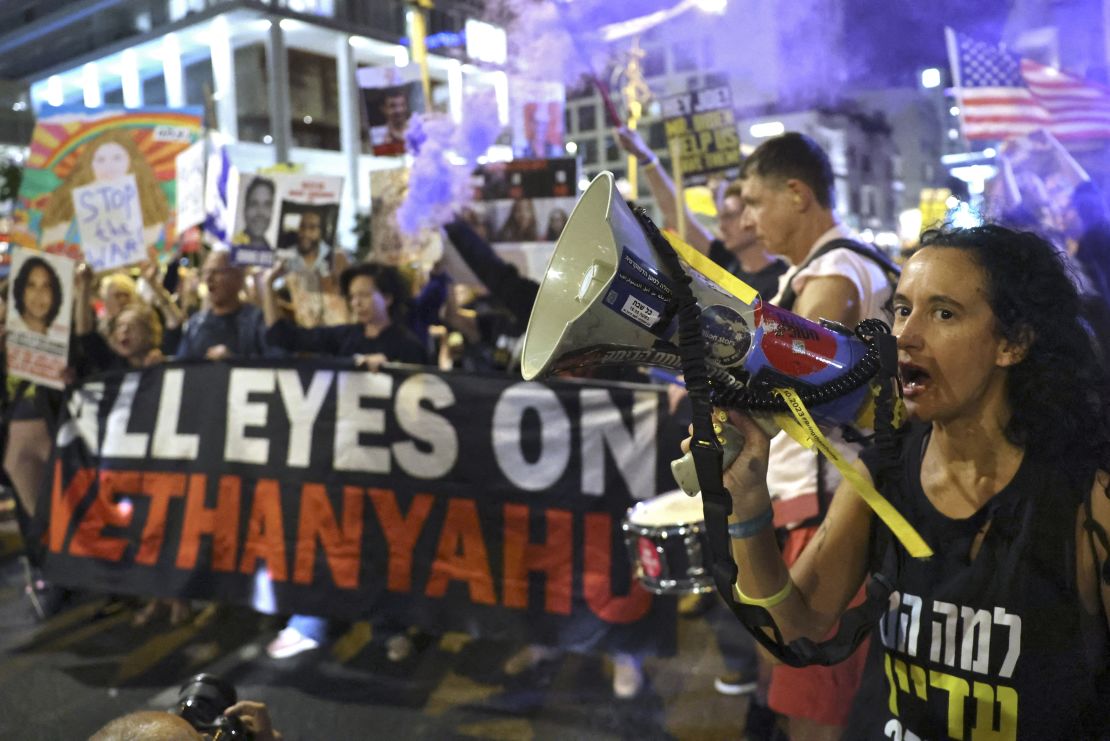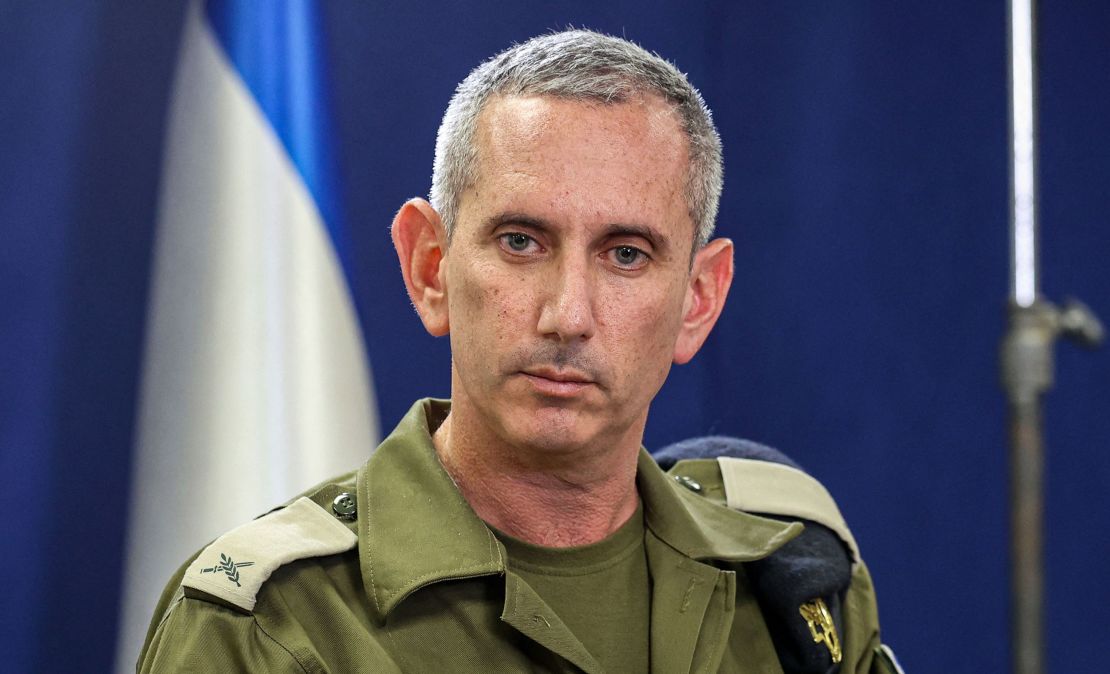CNN
—
Israeli police have arrested a top aide to Prime Minister Benjamin Netanyahu over allegedly leaking classified information to foreign media.
Opposition leaders say the intelligence was “faked,” and part of a ruse to thwart a ceasefire and hostage deal in Gaza.
The investigation centers on allegations that the prime minister’s office promoted to foreign media the claim that Hamas was planning on smuggling hostages out of Gaza over the Egyptian border and creating divisions in Israeli society to pressure Netanyahu into a hostage release and ceasefire deal.
Eliezer Feldstein, who has been named by opposition politicians as an aide to Netanyahu, is among several people being interrogated over the leak of “classified and sensitive intelligence information,” according to court documents. A court order made public on Sunday said that information taken from the Israeli military’s systems and “illegally issued” may have damaged Israel’s ability to free hostages held by Hamas in Gaza.
CNN is attempting to reach Feldstein for comment.
A spokesperson for Netanyahu denied that there have been leaks from the Prime Minister’s Office (PMO), and that the “person in question never participated in security-related discussions,” apparently referring to Feldstein.
The PMO also downplayed the possibility that the leak impacted negotiations with Hamas over the release of hostages from Gaza, calling the claim “ridiculous.”
Opposition leader Yair Lapid on Sunday accused the prime minister’s office of leaking “faked secret documents to torpedo the possibility of a hostage deal – to shape a public opinion influence operation against the hostages’ families.”
Families of hostages held in Gaza have accused Netanyahu of repeatedly thwarting an agreement with Hamas, believing that an end to the Gaza war would force the prime minister to hold elections. Netanyahu is alleged to have, in the past, torpedoed agreements with 11th hour demands – something he denies.

The alleged leaks were the basis of two articles published in September, one in the Jewish Chronicle, in the United Kingdom, and another in Germany’s Bild, both citing Israeli intelligence sources and supporting a narrative being pushed by Netanyahu at the time.
The articles were published as ceasefire and hostage release negotiations were ongoing, but also as thousands of Israelis demonstrated almost daily calling on the government to strike a deal with Hamas and bring Israeli hostages home.
Those demonstrations intensified after the Israeli military announced on September 1 that six Israelis were killed in Gaza – four of them were due to be released in a first wave of the potential deal.
The next day, Netanyahu held a news conference and presented an alleged Hamas document he said was found in a tunnel in Gaza. The document, he said, showed that Hamas was trying to divide Israelis. “I am not going to surrender to this pressure,” Netanyahu said, and reiterated his demand that Israel control the Gaza-Egypt border, also known as the Philadelphi corridor. Doing so would “prevent the smuggling of our hostages to Sinai,” he said. “They can pop up in Iran or Yemen.”

Just days later, Jewish Chronicle published an article claiming that intelligence sources said “Sinwar’s plan was to smuggle himself and the remaining Hamas leaders along with Israeli hostages through the Philadelphi corridor to Sinai and from there to Iran.”
The article said that the information was gleaned “during the interrogation of a captured senior Hamas official, as well as by information obtained from documents seized on Thursday, August 29, the day the six bodies of the murdered hostages were retrieved.” It has since been deleted, but an archived version is still available.
The prime minister’s son, Yair Netanyahu, promoted the article on his social media.
During a news conference on September 10, the Israeli military’s spokesperson, Rear Adm. Daniel Hagari, told a reporter: “I don’t know the kind of information you mentioned regarding Sinwar and the hostages in Philadelphi.”
During that same period, an article in the German newspaper Bild said a Hamas document it alluded was written by Yahya Sinwar allegedly showed how the group was drawing out the war and was trying to create divisions within Israel and build pressure on the families of the hostages’ families so they in turn could pressure the government. Bild cited an intelligence document and echoed the claims Netanyahu had made in his September 2 news conference.

In a statement on September 8, the Israel Defense Forces (IDF) said the document cited by Bild was not written by Sinwar and that it was an old document found five months ago and “written as a recommendation by middle ranks in Hamas and not by Sinwar.”
The information did not “constitute new information,” the IDF said, adding that it was “presented to the decision makers several times, even before the document in question was located.” The statement added it is investigating the leak of the document, which “constitutes a serious offence.”
Following the court’s lifting of a gag order on Sunday, families of Israeli hostages held in Gaza pointed their fingers at the prime minister’s office, saying “suspicions indicate that people associated with the prime minister acted to carry out one of the biggest deceptions in the history of the country.”
Israeli opposition leader Yair Lapid and Benny Gantz – who quit Netanyahu’s wartime cabinet earlier this year – have seized on the alleged leaks as a failure at the very top of government, with Gantz calling it a “national crime.”
Both have blamed Netanyahu’s office for the leak, with Gantz accusing Netanyahu of leveraging the leaks for political gains. Lapid also questioned whether the leak might have been intentional as hostage negotiations with Hamas foundered earlier in the year, according to a joint statement by the two opposition leaders on Sunday.
“It is suspected that Netanyahu’s team published secret documents and faked secret documents to torpedo the possibility of a hostage deal,” Lapid said in a statement. “This affair came out of the Prime Minister’s own office, and the investigation must examine if it wasn’t at the Prime Minister’s orders.”
Dana Karni and Mike Schwartz contributed to this report.


